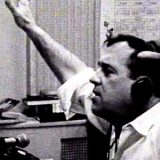Fair Use? To Sony, It’s Baloney
What would you do if a minute or so of one of your podcast episodes was used as a teaching example in an online class? What if it were reviewed in someone else’s podcast? What if it found its way into a program on PodcastOne, Midroll or SiriusXM radio?
I’d probably tweet the hell out of it, after which I’d spend a few moments looking at my beaming face in the mirror. The last thing—the very last thing—that would come to mind would be to issue a DMCA takedown order for copyright infringement.
But, I’m not Sony.
What Was Sony Thinking?
A few weeks ago, Harvard Law professor William Fisher, a recognized copyright law expert, devoted 24 minutes of an online course to, of all things, using copyrighted music. If there’s a topic broadcasters and podcasters need to know more about, it’s avoiding the pitfalls of copyright infringement when including copyrighted music in a broadcast or podcast. If I were an artist, composer or record label I’d want Fisher’s lecture to be mandatory viewing, if only to cut down on the number of inadvertent infringement events I had to deal with.
Shortly after Fisher’s lecture was posted on YouTube, Sony issued its takedown demand.
In explaining cover songs and compulsory licenses, Fisher used some clips of Sony-licensed music. This post (author not credited) from Techdirt.com, picks up the story:
The clips played are all versions of the Jimi Hendrix classic song Little Wing…In the lecture, Fisher plays approximately the first 45 seconds of the song…Then, to demonstrate specific points about cover songs, he plays approximately 15 seconds of a cover by Santana and Joe Cocker. Then about 35 seconds of a version by Stevie Ray Vaughn, and finally about 40 seconds of a version by The Corrs. By my count, a little over 2 minutes of the entire 24-minute video are music clips.
Maybe Sony Let Computers Do the Thinking
Initial reports stated that Sony issued the DMCA takedown order, citing its copyright ownership. Comments around the web have suggested that the takedown was a result of Google’s ContentID match. Either way, the “offending” video was pulled from YouTube.
I put offending in quotes, because if there ever were an example of fair use, this is it.
The video has been re-instated on YouTube, and that action is, to me, representative of the problem. Our system of using copyrighted music is broken and needs to be fixed.
Charlie Harding, co-host of Switched On Pop, a unique podcast that analyzes pop music from the point of view of a musicologist, once told me he routinely had to deal with hosting services that blocked his episodes simply because their automatic scanners detected copyrighted music. When he got a service’s attorney to listen to the show, he or she routinely cleared the content on its face.
That’s Not the Way it Should Work
Copyright owners should be required to listen to the suspect content first, and block it only after making the determination that it violates fair use, or other, standards. They shouldn’t be pushing this back onto content producers, who have less time and fewer resources to deal with these non-issues.
Fair use was included in copyright law specifically to allow free and open discussions of issues. This automated takedown system casts a chill over that freedom, by making the person claiming fair use guilty until proven innocent. That puts copyright law in the same category as the Tax Court. The music industry should not have the same power as the IRS.
If you’re inclined to write your elected representatives, especially as they come up for election in November, why not offer this suggestion: DMCA takedown demands that a reasonable person would find specious should be subject to a penalty. Corporations think twice when their computers have to write checks.
We Deserve Better Than a Bunch of Knee Jerks
These knee-jerk takedown demands affects us all, if not immediately, then certainly in the near future. As podcasting’s cultural profile increases, the business will become a larger target for many types of legal actions. We don’t deserve to wear a bullseye on our backs for doing the right thing.
As for Prof. Fisher, he was trying to help us understand how to avoid running afoul of the very thing Sony did. It’s not only ironic, but it brings to mind an old advertising slogan Sony used in the 60s and 70s: Sony. No baloney.
Sounds as if it took 40 years but they finally received a new shipment.









